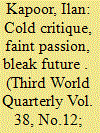|
|
|
Sort Order |
|
|
|
Items / Page
|
|
|
|
|
|
|
| Srl | Item |
| 1 |
ID:
156651


|
|
|
|
|
| Summary/Abstract |
This article carries out a psychoanalytic critique of Post-Development, arguing that the latter’s inattention to the unconscious underpinnings of power not only leaves it unable to explain why development discourse persists, but also deprives it of a radical politics, resulting in a surrender to global capitalism. Drawing on the work of Escobar, Ferguson and Esteva, the article valorises Post-Development’s important insights on the production of development discourse and its attendant power mechanisms. But using a Lacanian lens, it also probes Post-Development’s failure to address how power is mediated at the level of the subject: in maintaining that (capitalist) development is produced discursively in a cold, impersonal way (like an ‘anti-politics machine’), Post-Development ignores the fact that such power is only able to take hold, expand and, crucially, persist through unconscious libidinal attachments (e.g. desires, enjoyment). This failure leaves Post-Development with few resources – beyond localised resistance (Escobar, Esteva) or the call for a universal basic income (Ferguson) – to address the structural challenges of global capitalism. Psychoanalytically speaking, such a (Left) position appears to manifest a secret desire that nothing too much must change: Post-Development may well criticise the disciplinary mechanisms of neoliberal development, but ultimately it engages in an unconscious acceptance of capitalism.
|
|
|
|
|
|
|
|
|
|
|
|
|
|
|
|
| 2 |
ID:
160163


|
|
|
|
|
| Summary/Abstract |
In 1968 a popular movement emerged on the streets of Pakistan which toppled the regime of General Muhammad Ayub Khan and ushered in the Pakistan People's Party (PPP). After a decade of military rule this movement was heralded as a turning point in the country's political fortunes. However, the war in 1971, the failure of the PPP to live up to its radical slogans, and Pakistan's eventual return to military rule in 1977 were seen as clear indications of the failure of both the movement and the PPP. This article focuses on the area of Kot Lakhpat in Lahore and the emergence of a worker-led court under Abdur Rehman to argue that this narrative of the failure of the movement does not leave space for local success stories which, while temporary, had an important impact on the role that the working classes imagined for themselves within the state. The Kot Lakhpat movement was part of a longer history of labour politics, and its story challenges the centrality of the PPP and shows how local structures of authority can be formed in response to the greater space for radical action opened up by a wider national resistance movement.
|
|
|
|
|
|
|
|
|
|
|
|
|
|
|
|
|
|
|
|
|